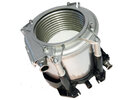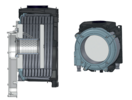I'm quoting a two year old post below. It seems categorical that the 75% mentioned is 75% of the range rated maximum. I imagine we would have an ignition sequence (3 or 4 seconds?) at perhaps 50% of full output, followed by maybe 10 seconds also at that output to check the flame is stable. Then the boiler drops to 75% of range rated output, then gradually ramps up. As regards some other manufacturers, this info is not easy to get hold of. I have no idea how Worcester Bosch and Ideal do it.
Both the software and heat exchanger are different between the Vision S and the Vibe Max.
The latest software starts the boiler at 60% of the range rated output and that’s the max for 15 minutes.
In that time the flow temperature will modulate but the max output is capped.
If demand continues uninterrupted for 15 minutes the software will increase the 60% to 70% as continued demand from external controls indicates the need for space heating. This time and power incremental increase repeats until either the boiler setpoint is reached or external control contacts open.
As far as I’m aware this is the only boiler range on the market that does this until our new models are released.
It’s quite logical and increasingly necessary as heat loss from properties is reducing and the vast majority of firings are restarts from a hot state, not from cold.
Relying on modulation alone doesn’t work particularly well as even the high modulating boilers which will drop to less than 2kW if hot refire at 75% of max meaning it hits setpoint almost immediately resulting in micro-firing rapidly. Their software has had to be refined to try to get over that situation.



